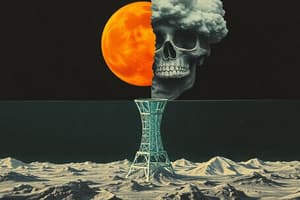Podcast
Questions and Answers
Enthalpy of an ideal gas is a function only of:
Enthalpy of an ideal gas is a function only of:
- Entropy
- Pressure
- Internal Energy
- Temperature (correct)
Which of the following is the most efficient thermodynamic cycle?
Which of the following is the most efficient thermodynamic cycle?
- Brayton
- Otto
- Diesel
- Carnot (correct)
What is the first law of thermodynamics?
What is the first law of thermodynamics?
- Entropy of the universe is increased by irreversible processes
- Internal energy is due to molecular motions
- Energy can neither be created nor destroyed (correct)
- Heat energy cannot be completely transformed into work
An ideal gas is compressed isothermally. What is the enthalpy change?
An ideal gas is compressed isothermally. What is the enthalpy change?
What is the name of the process that has no heat transfer?
What is the name of the process that has no heat transfer?
An ideal gas is compressed in a cylinder so well insulated that there is essentially no heat transfer. The temperature of the gas:
An ideal gas is compressed in a cylinder so well insulated that there is essentially no heat transfer. The temperature of the gas:
What is the SI unit of pressure?
What is the SI unit of pressure?
The equation Cp = Cv + R applies to which of the following?
The equation Cp = Cv + R applies to which of the following?
In the flow process, neglecting kinetic and potential energies, the integral of Vdp represents what?
In the flow process, neglecting kinetic and potential energies, the integral of Vdp represents what?
It is the mechanical energy of pressure that is transformed into energy of heat.
It is the mechanical energy of pressure that is transformed into energy of heat.
If Joule Thompson coefficient is equal to zero, then the process will become:
If Joule Thompson coefficient is equal to zero, then the process will become:
If the fluid will pass through a nozzle, then its entropy will:
If the fluid will pass through a nozzle, then its entropy will:
Which of the following converts fossil fuels into shaft work?
Which of the following converts fossil fuels into shaft work?
Dissolve gases like _______ will make water corrosive and react with metal to form iron oxide.
Dissolve gases like _______ will make water corrosive and react with metal to form iron oxide.
What is the critical temperature of mercury?
What is the critical temperature of mercury?
What is the critical pressure of mercury?
What is the critical pressure of mercury?
What is the method used in converting heat directly to electricity by magnetism?
What is the method used in converting heat directly to electricity by magnetism?
Which of the following is NOT a material used for thermoelectric elements?
Which of the following is NOT a material used for thermoelectric elements?
The law which states that 'when a conductor and a magnetic field move relatively to each other, an electric voltage is induced in the conductor'.
The law which states that 'when a conductor and a magnetic field move relatively to each other, an electric voltage is induced in the conductor'.
It is a device that transfers heat directly to electrical energy by utilizing thermionic emissions.
It is a device that transfers heat directly to electrical energy by utilizing thermionic emissions.
The theory of changing heat into mechanical work.
The theory of changing heat into mechanical work.
Average pressure on a surface when a changing pressure condition exists.
Average pressure on a surface when a changing pressure condition exists.
Which of the following cycles consists of two isothermal and two constant volume processes?
Which of the following cycles consists of two isothermal and two constant volume processes?
A control volume refers to what?
A control volume refers to what?
Flashcards are hidden until you start studying
Study Notes
Thermodynamics - Chapter 1 Study Notes
- Enthalpy of an ideal gas is solely dependent on temperature.
- The Carnot cycle is the most efficient thermodynamic cycle.
- The first law of thermodynamics states that energy cannot be created or destroyed, only transformed.
- Isothermal compression of an ideal gas results in zero enthalpy change.
- A process with no heat transfer is known as an adiabatic process.
- Compressing an ideal gas adiabatically causes its temperature to increase.
- The SI unit for pressure is the Pascal (Pa).
- The relationship Cp = Cv + R applies to ideal gases.
- In a flow process, neglecting kinetic and potential energies, the integral of Vdp represents shaft work.
- Enthalpy is the mechanical energy of pressure converted into heat energy.
- A Joule-Thomson coefficient of zero indicates an isothermal process.
- The entropy of a fluid passing through a nozzle remains the same.
- Thermal power plants convert fossil fuels into shaft work.
- Dissolved oxygen and carbon dioxide (O2 and CO2) in water make it corrosive, reacting with metal to form iron oxide.
- The critical temperature of mercury is 1460 °C.
- Magnetohydrodynamic (MHD) is the method of converting heat directly to electricity using magnetism.
- Zinc telluride is not a material used for thermoelectric elements.
- Faraday's Law states that moving a conductor and a magnetic field relative to each other induces an electric voltage in the conductor.
- A thermionic generator converts heat directly into electrical energy using thermionic emissions.
- Thermodynamics is the theory of converting heat into mechanical work.
- Mean effective pressure is the average pressure on a surface during a changing pressure condition.
- The Stirling cycle consists of two isothermal and two constant volume processes.
- A control volume refers to a fixed region in space.
Studying That Suits You
Use AI to generate personalized quizzes and flashcards to suit your learning preferences.




